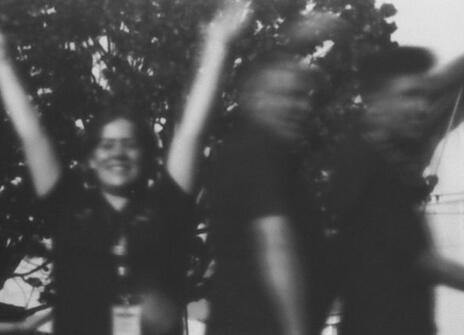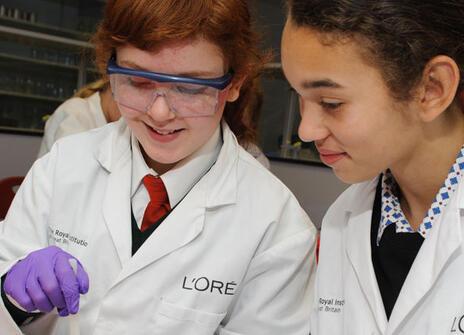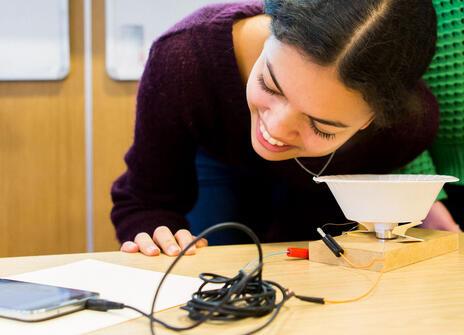An imaginative science laboratory in the heart of London
Our books for Autumn term 2025 are now open. Please send an email to ysc@ri.ac.uk with the workshop you would like to book and details about the age & size of group you are hoping to bring. Bookings for 2026 will open in June.
The L'Oréal Young Scientist Centre (LYSC) is an imaginative science laboratory at the heart of the Ri, where young people aged 7–18 and their teachers can experiment and explore science and technology outside the classroom.
What happens in an LYSC workshop?
In an LYSC workshop, students become a scientist for the day, testing their own ideas by designing creative experiments. The whole experience ignites a passion for scientific discovery and encourages curiosity-driven learning.
Students are given the time and space to experiment. Not constrained by time to produce a ‘right’ result, students work as professional research scientists do: in response to their observations, encouraging curiosity-driven learning.
And just as in the best research laboratories, students have access to advanced technology and experiments outside the remit of the normal school curriculum, making this a school science trip to remember.
We have a range of workshops you can choose from:
Cosmetic chemistry (key stage 2 and lower key stage 3)
Students get hands-on and make their own bath bombs and lip balms whilst learning fundamental chemistry.
This workshop is a great introduction to pH, neutralisation, solubility and changes of state.
About the workshop
This workshop is designed for students between the ages of 7–12 and lasts for around 4 hours, including a 30 minute break for lunch (not provided).
Group sizes depend on age and circumstance.
What students will learn
Students will investigate the difference between acidic and alkaline solutions and how they neutralise each other by forming a salt, and observe oils and waxes dissolving into one another. The students will gain a better understanding of the chemical processes behind toiletries such as bath bombs and lip balms.
Magnets and motors (keystages 2, 3 and 4)
This is a hands-on history of electromagnetism and how it led to the invention of the motor.
About the workshop
This workshop is designed for students between the ages of 10–16 and lasts for around four hours including 30 minute break for lunch (not provided).
The maximum group size is 24.
What students will learn
Students will improve their understanding of how magnetism and electricity are linked and the important electromagnetic principles which drive our modern world.
Following a practical reminder of basic magnetic principles, students watch a demonstration of Faraday’s original electric motor and build their own battery-powered motor .
Spectacular colour chemistry (key stage 3, GCSE and A-Level)
About the workshop
This workshop is designed for students between the ages of 11–18, and lasts for around 4 hours including a 30 minute break for lunch (not provided).
The maximum group size is 24. When booking, please specify the age group you are bringing to the YSC as workshop content varies.
Key stage 2 and key stage 3 groups
Students will investigate the differences between the primary colours of pigments, and the primary colours of light. They will also investigate differences between natural and synthetic dyes. Students will then explore how coloured light can be produced during a flame test experiment.
GCSE and A-Level groups
Students begin by studying how chemical bonding can lead to colour in pigments, producing a natural and azo dye. They then observe how coloured light can be used in analytical chemistry, designing a colorimetry experiment to determine the unknown concentration of a dye sample.
All versions of the workshop end with a colourful fire show from a YSC presenter.
Gene jewellery – extract your own DNA (upper key stage 2 and key stage 3)
Learn about this amazing molecule that codes for who we are.
This workshop is a great introduction to enzymes, DNA structure and uses equipment usually found at degree level.
About the workshop
This workshop is designed for students between the ages of 10–14 and lasts for around two hours.
The maximum group size is 30.
What students will learn
Students will extract their own DNA and walk away with a small piece of it in a necklace. After harvesting their own cheek cells, they will extract DNA by using a lysis buffer and protease digestion.
To precipitate the DNA out of solution, ice cold ethanol is used which can then be transferred into a necklace.
Crash testing – high velocity eggsporter (key stages 3 and 4)
Learn how vehicles are designed to keep us safe in a collision and use your knowledge to protect an egg passenger during a real crash test.
About the workshop
This workshop is designed for students between the ages of 11–16 and lasts for around four hours, including a 30 minute break for lunch (not provided).
The maximum group size is 24.
What students will learn
In this workshop students will be building and crash testing a vehicle, with the aim being to keep their egg passenger alive. Students will learn about vehicle safety and forces in a very practical way.
This workshop was developed with Dinos Visvikis of the Transport Research Laboratory (TRL).
Forensics (upper key stage 3, key stages 4 and 5)
Learn the basics behind the forensic applications of DNA and help to solve a ‘murder’.
This workshop is a great introduction to genetics and forensic analysis, using processes that many students do not have practical exposure to before attending university.
About the workshop
This workshop is designed for students between the ages of 13–18 and lasts for around four hours, including a 30 minute break for lunch (not provided).
The maximum group size is 24.
What students will learn
During this workshop students will evaluate a crime scene and analyse suspect DNA samples, using modern molecular biological techniques including restriction digests and gel electrophoresis.
Bacterial evolution (key stages 4 and 5)
Step into the role of a clinical bacteriologist and use research-grade laboratory equipment to investigate DNA samples from new outbreaks of bacterial disease.
About the workshop
This workshop is designed for students between the ages of 14–18 and lasts for around 4.5 hours, including a 30 minute break for lunch (not provided).
The maximum group size is 24.
What students will learn
Students use restriction enzyme digests and gel electrophoresis to analyse and learn about DNA, restriction enzymes and evolution. At the end of the workshop students look at the DNA evidence and decide what advice to give their colleagues at the scene of the outbreak.
Book now
Email us at ysc@ri.ac.uk for bookings and to discuss your workshop.
Frequently asked questions
How long does an LYSC workshop last?
We offer half- and full-day LYSC workshops.
What ages can attend?
We offer workshops for students aged 7–18. Our experienced LYSC team are able to tailor our workshops to suit the level and ability of your students.
How many students can attend?
Workshops are offered to school groups of up to 30 students.
What key stages are the workshops suitable for?
We have a range of workshops which are suitable for key stages 2-5.
Can you cater for students with special educational needs (SEN)?
Yes. Please talk to the LYSC about your students requirements when you make your booking.
What subjects do you cover?
Our range of workshops cover biology, chemistry, physics and engineering.
Do you offer workshops outside of term time?
Yes, we also offer workshops during school holidays.
Can a group of home educators book a workshop?
Yes, we welcome bookings from groups of home educators.
"The visit was invaluable... they learned much about the scientific method and were fully engaged throughout the day."


